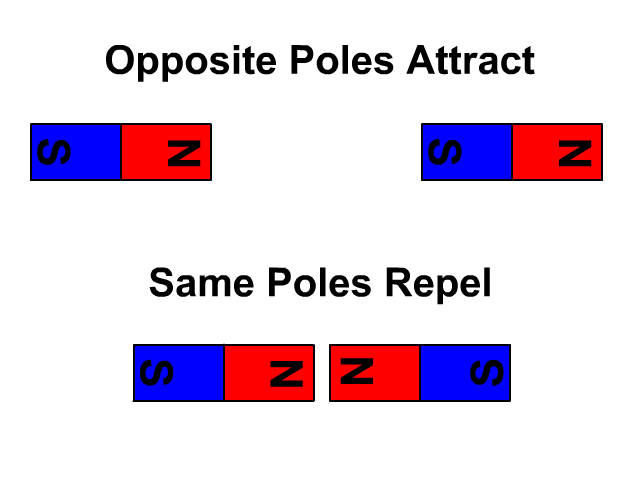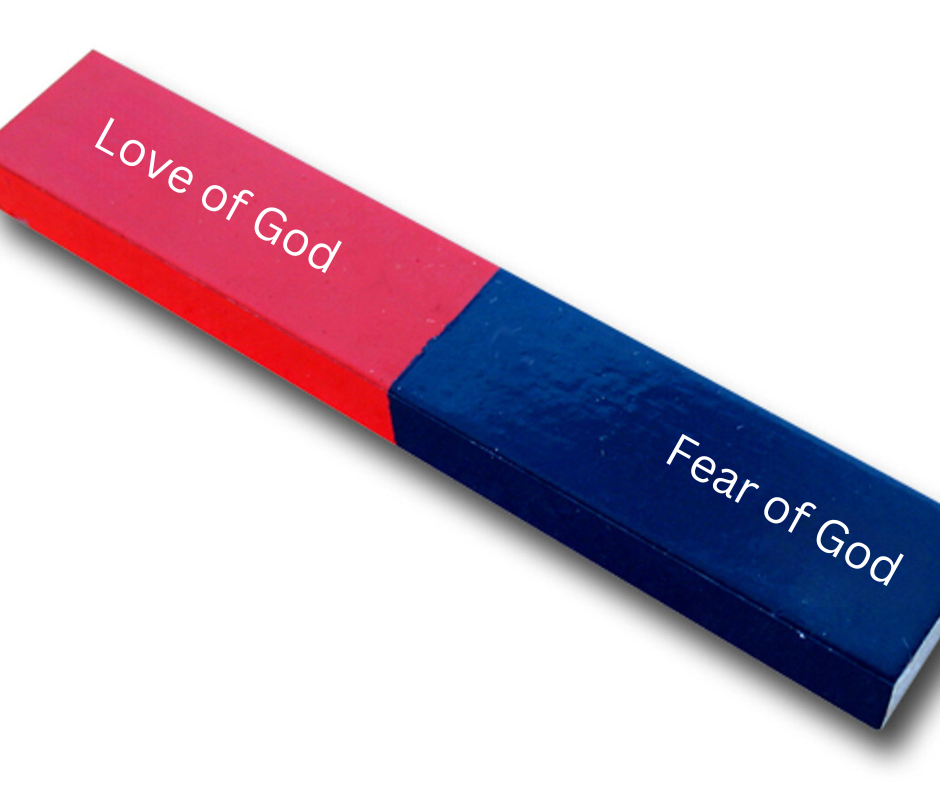Love of God; Fear of God
Throughout the Bible we come across the expression fear of the Lord. It no doubt refers to a complex aspect of life and is far from simple. For a few thoughts on it, see “Who Do You Fear?”. Clearly, it is meant to play a significant role in life. If not, why does it appear so often? Alongside this “fear of the Lord,” another prominent idea emerges throughout Scripture: love for God. How do fear and love of God relate?
A bar magnet
Maybe the fear of the Lord and love of the Lord work kind of like this.
Envision a bar magnet.

As you know, a magnet has two distinct magnetic poles: the north pole and the south pole. As any kid can tell you, opposite poles attract and like poles repel.

So far, so good. Magnets attract and repel.
As you certainly know, this is why traditional compasses work. The magnetized needle interacts with the magnetic field of the earth, attracted by one pole and repulsed by the other, making it move.
The Love and Fear Magnet
Now let’s take this magnet and put love of God on the north end and fear of the Lord on the southern end.

To complete the image, we need to add one more piece to our metaphor: a compass. Look at this video and pay attention to how the magnet interacts with the compass.
There is a push-pull interaction of the magnet with the different ends of the compass (anyone who is into physics could go more deeply into the way the different magnetic fields interact, but we can ignore that for our sake). Either end of the magnet works to push the compass in the direction you want it to go.
You life should be like that compass needle. The love of God should keep us pointing in the right way. It connects us to the vital life of God and draws us ever towards him and the blessings he has. The fear of the Lord serves the same point: keeping us in connection with God. But it does so in almost the opposite way. The fear of the Lord is a force that repulses us from wickedness, sin, disobedience and disregard for God the creator and Redeemer.
Both love and fear of God need to move the needle of your life.
What is love, anyway? Meditations on love and hate in 1 John 3.11-18
“Love” and “loving” feature prominently in 1 John. Love is a notoriously tricky word in English—we all know that “I love pizza” and “I love my family” don’t really mean much of the same thing at all. Many people in church are also aware that there are several different Greek words which are often translated with “love” in English (someday, I’ll probably rant about the many ways this is misrepresented). When we work with a slippery word like “love,” it is best to let the context we read it in show us what is meant. What we see in 1 John is that love—the sort of love which John is talking about—is a divine reality.
Who is loving?
One way to approach understanding “love” in 1 John is to pose a question: who is able to love? On the surface, this sounds like a silly question. Anyone short of a fully deranged psychopath can most certainly love in some fashion or another. But when we look closely at the way John talks about love in 1 John, we have to give a more careful answer.
As 1 John 3.14 puts it:
“We know that we have passed out of death into life, because we love the brothers. Whoever does not love abides in death.” (ESV)
We could look at many other ideas in 1 John, but a short summary is that the ability to love in the sense that John is talking about comes from being born of God. We come to learn what (this sort of) love is in the act of God sending his Son Jesus to the world (1 John 3.16; 4.10). This sort of love is both ‘from God’ (4.7) and in some sense identical with God (4.8, 16).
The (sort of) love highlighted here in 1 John is not a special quality of love. It is not as though followers of God have a level of love to give which is ‘more’ than other people. Indeed, there are many who reject Jesus in this world and yet certain portions of their lives are inspiring examples of giving up themselves for the good of others. What is special about this love is its source. The love 1 John highlights is love from God which those born of God have and those not born of God do not have. It is “divine” love, displayed in Jesus to the world. All those born of Jesus are born into this sort of divine love.
The answer to the question “who is able to love?” in the sense that 1 John is talking about is simple: followers of Jesus.
Love vs. hate
This insight helps to make more sense of the not-loving = hating equation throughout 1 John. If loving fellow followers of Jesus is a special capacity given to those born of God, then to treat others in any other way is to reject the very gift of divine love which has reached down to us in Jesus. We reject the gift by not extending it in our actions to those whom God has already extended it to.
One way to think about the sort of love which 1 John is highlighting is to think about giving people what they deserve. People deserve certain types of treatment from you. The exact way you were taught to treat other people varies, but people deserve certain levels of love in the sense of “generic-benevolence” because they are an important person in your life, a fellow member of your community, or just someone who happens to be in need. Acts of self-denying giving in these contexts are all good and they are fitting. God created us to live in relationship with one another, giving for the good of the other. But these acts are not what 1 John has in mind.
1 John focuses in on God’s special act of love, his choice of a people to give himself to in self-denying compassionate devotion so that they may benefit. Anyone can experience this love—you must be born of God. Having received this love and benefited from it, it becomes the pattern and model for the love we give towards each other. And, significantly, the family identity as children of God and the power of the Spirit within us empowers us to give this (sort of) love to each other.
Acting towards one another in ways that reject giving this sort of love, that is hate. It is hate because it is willfully choosing to reject God’s pattern of love for the family which he has already extended to us.
How to be loving
Love in 1 John is like a little piece of God planted into you. This seed of God is meant to grow and give a continual harvest of blessings towards other followers of Jesus and to the world.
While 1 John focuses mostly on loving other believers, the pattern of love we see in Jesus is a pattern extended towards everyone, whether they know and receive it and benefit from it or not (1 John 2.2).
Where to start? One of the wisest things to do is pray: Spirit of God, give me opportunities to be loving to others; show me how the love of God which is planted in me ought to be lived out day by day.

If you have ever seen the movie Pirates of the Caribbean (preferably the first one, which was a good movie, as opposed to the rest, regarding whose quality I raise profound doubts), you may remember that captain Jack Sparrow has a compass that is unique. It doesn’t point north. Instead, it points the way towards whatever your heart most deeply desires.
The Spirit of God in our lives is kind of like that. God’s Spirit continues to point the way towards the heart of God—and God is love. We need to get better at reading the compass points because they will always guide us to acts of love for others.
Love is loyal
“Love is…” Fill in the blank. There are lots of different ways we could describe love. Our culture offers an entire palette of them to choose from. “Love” seems to me to refer mainly to heavily subjective feelings and states of mind. That is, love is seen first and foremost as a feeling experienced within a person. While I don’t want to downplay or denigrate the reality of a feeling or an array of feelings which we unobjectionably call “love,” the biblical witness requires us to dig deeper. A key reality often lost in contemporary notions is this: love is loyal.
Translation troubles: Hesed
Working through the book of Ruth, we encounter an important Hebrew word at three junctures: Ruth 1.8, 2.20, and 3.10. This word is hesed. In general, I try to avoid talking about Hebrew and Greek in non-academic contexts. I find them very interesting and have devoted a great deal of time and effort to understanding them. However, the role of talking about Hebrew and Greek is primarily the role of a scholar. Scholars have done great labor in the languages, culture, and history, so that we can read the Bible and study it in English without having to learn the original languages. That is a blessing of immense proportions!
There is nothing spiritual or esoteric about using this Hebrew word hesed. It just happens to be the case that there is no consistently good way to translate the word into English. It is complex word. Regular translations include “love,” “kindness”, “loving-kindness,” “mercy,” “loyal love,” and so forth.
The fundamental difficulty with rendering hesed into English is that it traffics in a different understanding of “love” and “kindness” than we usually use. Consider these verses from Psalm 136 (the repeated refrain throughout the psalm uses this word hesed):
1 Give thanks to the LORD, for he is good. His love endures forever.
This one is easy. We can square enduring love with goodness. But as the Psalm continues, we run into problems with using “love.” Consider a few different acts of God which are also attributed as examples of “his hesed endures forever”:
10 to him who struck down the firstborn of Egypt—His love endures forever.
15 [he] swept Pharaoh and his army into the Red Sea—His love endures forever.
18 [he] killed mighty kings—His love endures forever.
These are a little harder to fit into our idea of love and mercy. How does God killing people fit into his “loving-kindness”?
Love is…loyal
Throughout this entire Pslam it is God’s hesed that is under view. It quickly becomes clear that hesed is concerned with something which goes beyond our normal usage of the terms “love” and “mercy.” One scholar puts it this way:
“Hesed, however, describes a mutual relationship between man and man or between man and God. Translating it as “mercy,” “compassion,” or “love” destroys the concept of mutuality.”
Harold Kamsler, “Hesed – Mercy or Loyalty?”
This scholar highlights a tendency in our cultural context of understanding love and mercy as one-way actions: I love, she shows mercy, he is full of loving-kindness. Hesed, by contrast, has a strong notion of inter-connectedness. A strong notion of loyalty. A strong notion of relational obligations.
Here is an expansive definition:
“Hesed expresses, essentially, faithfulness and loyal conduct within the context of a relationship; it is an inward commitment and disposition of goodwill together with its outward expression in dutiful and compassionate action. The precise nature of that action depends upon the context, the relationship and also upon the relative positions and abilities of parties within that relationship.”
Robin Routledge, “Hesed as Obligation: A Re-Examination”
That’s a mouthful. But helpful.
My personal favorite quick and easy way to try to represent this is “loyal love,” but even that is not entirely satisfying.
The duty of love
What does duty have to do with love?
We might put it this way: love (in this hesed sense) is bounded within certain limits. This is not a bad thing. I love my family, for instance. I don’t love anyone in Kazakhstan. Not that I am opposed to anyone in Kazakhstan. I’m sure there are many nice people there who I could learn to love. But I have no connection, no commitment to anyone there. I can love them only in a very abstract sense of general benevolence. But I go home and sit with my wife and kids and we eat together, play together, fight together, laugh together, and all those things. We have a commitment to one another and within the boundaries of the commitment, love of a deep and profound kind flows.
The difference is that there is no relational commitment in my general benevolence towards people in Kazakhstan, but there is commitment undergirding our family relationships. Within my family, hesed exists and flows out in acts of care and concern for each other. The relational context is the matrix in which loyal-love has existence. A relationship is like the boundary lines within which hesed is possible.
God’s Hesed
This notion of hesed is important in Scripture. God is a God of love, yet it is a bounded love. Not bounded in the sense of limited, as though God ever runs out of love to give but bounded in the sense of it covers a certain area, if you will. Those outside of that “area” experience God’s general benevolence—“he causes the rain to fall on the just and unjust”—but not the deep and profound love, the hesed. That love flows within the bounds of relationship: his covenant, his people, those who have come to “live in the area of God’s love,” as it were. And within the bounds of this love, God’s love is not only a good thing, but a duty, a loyal thing. God fully commits himself to those who are within this “area.”
The Bible calls this “area” of God’s love many things: the kingdom of God, salvation, eternal life, being in Christ. What unites them is the undergirding reality that God fully and freely commits himself to any and all who come into this area of his love. And he commits to being for them and not against them, to be the giver of joy, to fill up their hopes…and all these things even when they fail to be as they should.
God holds up his loyal love
That last sentence is important. God remains faithful to his hesed, his covenant love, even when we don’t. That is part of why it is so important to keep a sense of duty and loyalty in our notion of love. Even when people in my family make me angry, or I make them angry, we continue in love. Not because we necessarily are happy with each other at the moment. But because we have loyal-love, dutiful love, love which finds its strength and existence in our relationship rather than in the transient nature of our feelings at the time.
The gold standard of this kind of hesed, loyal-love, is God reaching out to humanity in various promises (covenants). In these promises, God makes a commitment to humanity. The commitment sets the boundaries in which hesed exists. Those who enter in get to receive the endless bounty of God’s loyal-love…even when we fail to be loyal. Why? Because God’s loyalty to his commitments never runs out. While anger and frustration are not foreign to God in his dealings with humanity, he does not cease to be full of loyal-love.
This calls for praise! Praise God that his love is loyal to the end.
This calls for emulation: “Therefore be imitators of God, as beloved children. And walk in love, as Christ loved us and gave himself up for us” (Ephesian 5.1-2).

